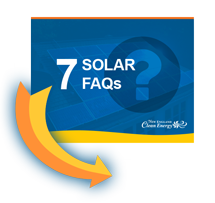Skeptics scoff when told that solar electric systems pay for themselves. I understand the skepticism because very few purchases in life truly pay you back.
But most people do get the concept of a purchase that saves money, like LED light bulbs or a more efficient water heater. Solar is like that, but better. You can’t tell exactly how much the light bulbs or water heater reduce your energy bills. You just know they’re helping when you see your electric bills go down.
Solar is Different
With solar, you can determine how much your system is saving you, based on how many kilowatt-hours you produce in a month. It’s also easy to track how much solar earns you through green income program like Massachusetts SMART, Rhode Island REG, or New Hampshire RECs.
Because you know your savings and earnings, you’ll know when your solar electric system has paid for itself. Today’s “payback” period is usually between five and twelve years, depending on your electricity rates and how much solar your system produces. Over the years, our estimates of customer solar production in our proposals have proven extremely accurate. Solar is that predictable.
(One customer recently commented on SolarReviews: “New England Clean Energy estimated I’d generate 4,000 kWh in my first year of ownership. They were off by only 0.1%.“)
What is an Acceptable Payback Period?
I find it funny (funny strange not funny haha) how some people get fixated on solar’s payback time. I once heard someone say, “I can’t wait 10 years for solar to pay for itself. I’m going to get central air instead.”
With all due respect to the commenter, that is a ridiculous statement. That central air will never pay for itself. Neither will a new patio or kitchen. A car? We all know cars only cost us money. A house? They’re known as money pits for a reason.
Your solar system price tag – after being slashed by 30% through a federal tax credit in the first year – drops to $0 after electric bill savings and green income equal your purchase price. Yes, zero. Nada. Nil.
And over 25 years (your panels are expected to last more like 40 years, by the way) a typical system will deliver tens of thousands of dollars worth of savings and green income after it pays for itself.
A bigger, more expensive system doesn’t necessarily mean a longer payback period, because the higher price is balanced by greater production and therefore more savings and income.
The Bottom Line
Even if your solar payback time frame is on the high end, say fifteen or even twenty years, that’s still better than NEVER, which is when most purchases pay you back.
If this doesn’t convince you to join the thousands already making their own clean energy, then all I can say is, enjoy your fossil-fuel-powered central air.
(This post assumes you buy your solar outright. If you finance your solar with a loan, it’s “paid for” whenever you make your final loan payment to the bank.)
If you liked this article, you might also enjoy:




 Download our 7 FAQs
Download our 7 FAQs


